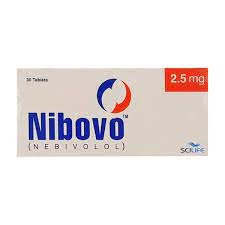Nibovo 2.5mg Tablet is a medication containing the active ingredient Nebivolol. Nebivolol belongs to the class of medications known as beta-blockers and is primarily prescribed for the management of various cardiovascular conditions.
Uses:
- Hypertension (High Blood Pressure): Nibovo 2.5mg Tablet is commonly prescribed for the treatment of hypertension to lower blood pressure and reduce the risk of cardiovascular events such as heart attack or stroke.
- Heart Failure: It may be used as part of the treatment regimen for heart failure to improve cardiac function and reduce symptoms such as shortness of breath and fatigue.
- Angina (Chest Pain): Nibovo 2.5mg Tablet can help alleviate symptoms of angina by reducing the workload on the heart and improving blood flow to the myocardium.
- Atrial Fibrillation: In some cases, Nibovo 2.5mg Tablet may be used off-label to manage atrial fibrillation, a type of irregular heart rhythm, particularly in individuals with concomitant hypertension or heart failure.
Side Effects:
- Fatigue: Fatigue or tiredness is a common side effect reported with the use of Nibovo 2.5mg Tablet.
- Dizziness: Dizziness or lightheadedness may occur, especially during the initial stages of treatment or upon standing up quickly from a sitting or lying position.
- Bradycardia (Slow Heart Rate): Nebivolol may cause a reduction in heart rate, leading to bradycardia, particularly in individuals with pre-existing sinus node dysfunction or conduction abnormalities.
- Peripheral Edema: Some individuals may experience swelling in the extremities, known as peripheral edema, as a side effect of Nebivolol therapy.
- Bronchospasm: Nebivolol may exacerbate bronchospasm in individuals with asthma or chronic obstructive pulmonary disease (COPD), particularly at higher doses.
Precautions:
- Pregnancy and Lactation: Nibovo 2.5mg Tablet should be used with caution during pregnancy and lactation. The potential risks and benefits should be discussed with a healthcare professional before initiating treatment.
- Diabetes: Beta-blockers like Nebivolol may mask symptoms of hypoglycemia in individuals with diabetes. Close monitoring of blood glucose levels is essential, particularly in diabetic patients receiving insulin or oral hypoglycemic agents.
- Peripheral Vascular Disease: Caution should be exercised in individuals with peripheral vascular disease, as beta-blockers may exacerbate peripheral vasoconstriction and impair peripheral circulation.
- Liver or Kidney Impairment: Dosage adjustment may be necessary in individuals with impaired liver or kidney function to prevent drug accumulation and potential toxicity.
When Not to Use:
Nibovo 2.5mg Tablet should not be used in individuals with a known hypersensitivity to Nebivolol or any other component of the formulation. It is also contraindicated in patients with severe bradycardia, heart block greater than first degree, cardiogenic shock, or decompensated heart failure requiring intravenous inotropic therapy.
FAQ:
- How should Nibovo 2.5mg Tablet be taken?
- Nibovo 2.5mg Tablet is typically taken orally, with or without food, as directed by a healthcare professional. It is essential to follow the prescribed dosage and regimen for optimal efficacy.
- Can Nibovo 2.5mg Tablet be used in children?
- Nibovo 2.5mg Tablet is not recommended for use in children and adolescents unless specifically prescribed by a pediatrician or cardiologist.
- Is Nibovo 2.5mg Tablet safe for elderly patients?
- Nebivolol may be used in elderly patients with caution and careful monitoring due to the increased risk of adverse effects such as bradycardia and hypotension.
- Can Nibovo 2.5mg Tablet be used in patients with asthma or COPD?
- Nebivolol should be used with caution in individuals with asthma or COPD, as it may exacerbate bronchospasm. Close monitoring of respiratory function is essential, and alternative treatments may be considered in some cases.






Reviews
There are no reviews yet.